Epilepsy in children: Part one
Written by:Epilepsy is a condition which affects adults and children alike. While it is known to many of us, there are a number of misconceptions out there about it. In part one of this two-part series Dr Basheer Peer-Mohamed, a senior consultant paediatrician, describes the symptoms and causes of epilepsy in children.

Do children have epilepsy?
Yes, epilepsy which is the medical term for seizures, fits or convulsions, can affect children of all age groups. It is estimated that about 1 in 150 children across all age groups have this medical condition.
What types of seizures or epilepsy do you see in children?
There are several different types of seizures, the common ones being generalised seizures and absence seizures. Other types include myoclonic seizures, infantile spasms, focal seizures and complex partial seizures. There are a few more types which are not as common as the ones mentioned above. Febrile convulsion is a specific type of seizure that affects children under six years of age whenever they have a high temperature due to simple childhood infections.
What symptoms does a child with Epilepsy have?
A child with epilepsy will usually be normal in between the attacks of seizures. The attacks themselves vary in symptoms depending upon the type of epilepsy.
- Generalised seizures start abruptly with loss of consciousness when the child is not aware of the surroundings and is not able to respond appropriately. The arms, legs or head and neck and eyes all shake rhythmically.
- Myoclonic seizures present as sudden brief twitching of a part of the body such as in the face, jaw, shoulders or arm or leg with no loss of consciousness and they generally last less than a second in duration but can occur in clusters or repeated attacks.
- Focal seizures, on the other hand, are characterised by sustained rhythmical jerking of just one part of the body with no loss of consciousness.
- Absence seizures are usually subtle and therefore there is often a delay before parents recognise the problem. The child will have five to ten second-long periods of sudden pause in activity and would appear to look vacant or be staring into the distance, followed by an abrupt return to normal activity. Although they can occur several times a day, they are very brief and subtle and so, it might take some time to recognise the seizure.
- Infantile spasms are a particular type of seizure that is seen only in infants (under one year old) and the movements can be subtle to start with. There will be sudden forward bending of arms, head and the legs lasting one or two seconds followed by relaxation of the body. There might be further repetition of the movements occurring about five or ten times. This is a particularly important type of seizure to recognise and treat early.
What causes epilepsy?
Epileptic seizure occurs when there is abnormal electrical activity in the brain and this can be caused by a number of things such as previous head injury, meningitis, problems at birth or structural problems in the brain. We are becoming increasingly able to identify genetic disorders that could make a child prone to have epileptic seizures. A genetic disorder is caused by a change to the DNA or genes and if it affects specific areas relating to the brain, it can lead to the development of epilepsy. Having said that, in a large number of children with epilepsy particularly with generalised or absence seizures, we do not find a specific underlying cause.
Read more: Epilepsy in children: Part two
If your child is experiencing this or any other health issue, you may benefit from expert paediatric care from a specialist. Visit Dr Basheer Peer-Mohamed’s Top Doctors profile to request an appointment with him.


